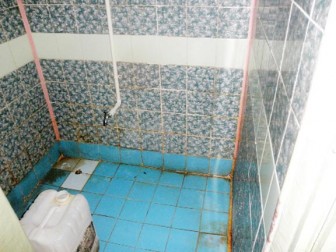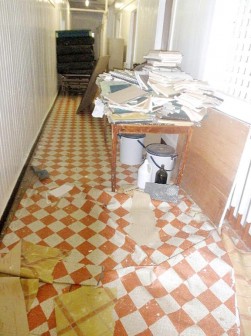The West Demerara Regional Hospital (WDRH) continues to be beset by early morning water shortages, limited staffing and buildings badly in need of rehabilitation and patients say they are the “real losers” since they have no choice but to endure the situation.
More than a week ago, WDRH nurses bemoaned the poor working conditions at the facility, after two nurses were attacked by dogs, which had made the compound their haven. Through their union representative, the nurses moved against the hospital administration and demanded better working conditions, including relief from the stray animals that invaded the compound and wards, as well as the faulty roof and floor in a building that houses the Male and Female Medical Wards.
Approximately 25 dogs and about 4 cats, a hospital official who asked not to be named told Stabroek News, were “put down” earlier this week. However, the hospital administration has still made no definite commitment to repairing the faulty building. The roof leaks in several spots and the floor boards have began to rot due to a combination of damp conditions, years of poor maintenance and the age of the building.
Newly-appointed administrator at the hospital Bharrat Persaud, who was handed two letters of grievances on his first day, has declined to speak on the matter. He told Stabroek News last week that the hospital administration had met with nurses and their representatives and that efforts were being made to resolve the matter.
However, the hospital official said that the problems at the facility go beyond the animals. “When you take a look around this place you find it absolutely hard to believe that this is one of the country’s main medical facilities… and we do not feel that our plight is being taken seriously. The administration is making promises but they are not doing nothing and by this time we would have expected to hear from the Minister of Health or at least someone from his ministry but no one seems to be recognising the plight of the West Demerara nurses and patients,” the official added.

The official further noted that the fact that major health facilities like the WDRH are under-maintained contributes to the Georgetown Public Hospital Corporation (GPHC) being overcrowded at certain times. Almost all serious cases which come to WDRH, the official said, must be transferred to GPHC due to the poor condition at the facility and the lack of staff. These issues have been in existence for more than two years and are being allowed to get worse, the official also emphasised. “After seeing all these miserable things in the media…after seeing the truth of the West Dem Hospital, I thought the Ministry of Health would try to make things better even out of embarrassment…but it seems that no one tries to fix anything in this country until it has reached an irreparable state,” the official added.
‘The sick people’
Nurses are not the only ones who suffer because of the poor conditions at the facility, a patient at the WDRH told Stabroek News via telephone. The woman, who has been a patient at the institution for several weeks now, said that while a nurse has to suffer through one or possibly two shifts at the hospital, she and others like her are forced to endure it for days at a time. “Just because I don’t have the money to go to a private hospital to get better treatment, I got to put up with this,” she lamented. “Is almost like people don’t pay tax in this place… this is the sort of things poor people have to put up with just because they poor.”
The patient on the bed next to her, the woman said, had been crying out for pain for more than 12 hours but no nurse paid her any mind. “This woman crying out to them and me and some other people start asking them to do something for her. This one nurse told her to shut up because there was nothing they could do about it,” the woman recounted. “I suppose this is what happens when workers are not happy but what these people have to realise is that they are not the only ones who are suffering. The sick people like me are the real losers in this whole thing.”
The WDRH administration recently moved the Female Surgical Ward (FSW) to the third floor of the building in which it is housed. This was done to facilitate rehabilitation works to the second floor on which the FSW was originally located.
Patients and their relatives believe that this move was prompted by the recent complaints voiced by nurses about the terrible conditions of the medical institution. However, one visitor to the facility said that the move to the third floor has only worsened the situation.

The woman, who spoke with this newspaper on the condition of anonymity, said that she has been frequenting the medical institution in recent weeks after her niece was admitted. “At first my niece was on the second floor and then after the nurses kicked up a storm about the conditions under which they were working, they moved the patients to the third floor,” she said.
Visitors, according to her, have to walk through “a house of horrors” before they can get to the third floor. Piles of old books and bits of furniture have been stacked in the hall which is used by visitors to get there, she said, while pointing out that some of the items are precariously stacked and can fall on passers-by if they are not careful.
The linoleum in the halls and even on the floor of the FSW, she further explained, is torn in many places. “This is dangerous,” she said. “If you’re not careful to watch where you walk then you can trip.”
There is also an early morning water shortage at the hospital and there is no water available until after 7am. “The place is just nasty and smelly,” the woman said. “In the morning there is no water to do anything and the toilets are left un-flushed… sometimes there are a few jars of water available but that is all. Tell me is this supposed to be the conditions of our hospital?”
There are also two females who suffer from psychiatric disorders, who are being allowed to live in the FSW. The woman said that it is dangerous and irresponsible to have these women there. “If they don’t have a ward for them here, then they should send them to Georgetown Hospital, where they can actually get some treatment,” she said.








